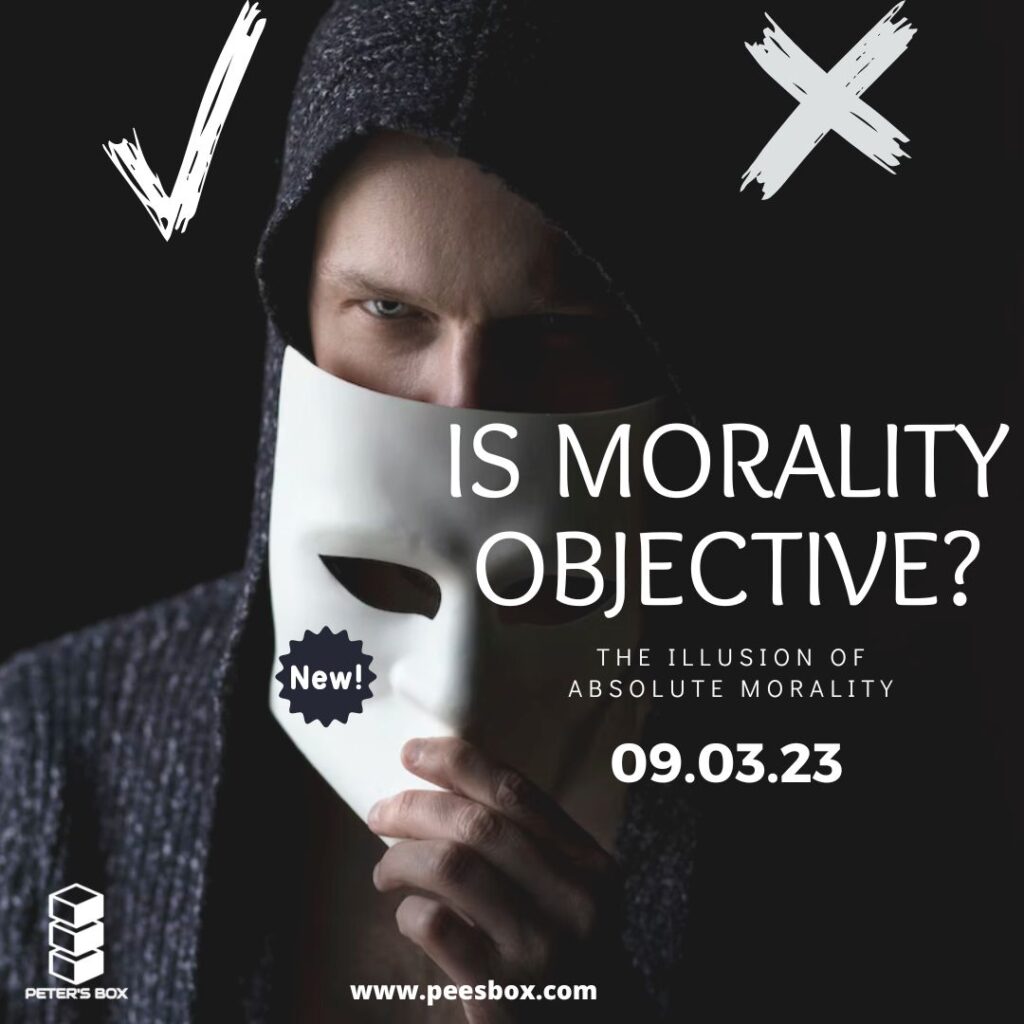Last updated on June 2nd, 2023 at 07:21 am
Are you thinking of starting a blog? Read my earlier post, “Blogging Basics,” to learn more about some of the things I wish I had known before I began blogging. In today’s post, “Is Morality Objective?” I’d like to share my views on the metaethics of the question. Continue reading to find out my response!
Is Morality Objective?
Is morality objective? Is the answer “yes” or “no”? Before I give you my response, let’s dissect the question.


Definitions
Objective
The Oxford dictionary defines “objective” as (of a person or their) not influenced by personal feelings or opinions in considering and representing facts.
According to the Merriam-Webster definition, something that is “objective” is outside of the mind and independent of it.
That is to say, the fact will still exist even in the absence of human cognition or judgment.
Substituting this definition of objective in our question, we have:
Is morality not influenced by personal feelings or opinions in considering and representing facts? By employing the second definition, we may ask, “Is morality outside of the mind and independent of it?“
Morality
Let’s define morality.
The Oxford dictionary defines morality as principles concerning the distinction between right and wrong or good and bad behaviour.
According to the Collins dictionary, morality is the belief that some behaviour is right and acceptable and that other behaviour is wrong.
We may rewrite our question by substituting the definition of morality.
Are the principles concerning the distinction between right and wrong or good and bad behaviour objective?
Is the belief that some behaviour is right and acceptable and that other behaviour is wrong, objective?
Is Morality Objective?
By merging the two definitions, we may further refine our question as follows:
- Are the principles concerning the distinction between right and wrong or good and bad behaviour outside of the mind and independent of it?
- Are the principles concerning the distinction between right and wrong or good and bad behaviour not influenced by personal feelings or opinions in considering and representing facts?
- Is the belief that some behaviour is right and acceptable and that other behaviour is wrong outside of the mind and independent of it?
- Is the belief that some behaviour is right and acceptable and that other behaviour is wrong not influenced by personal feelings or opinions in considering and representing facts?

Buckle up!
I am positive that you have a good understanding of our question now. So, morality may be framed as the judgement of what is good and bad by defined standards. Here, it should be noted that morality is fundamentally the “judgement” or “discernment” of what is good or bad. It is the process of determining what is good and bad. It requires a reference to some norm to declare an activity to be moral (good) or immoral (bad). Please let me know if you disagree with my notion of morality.
Keep in mind this understanding of morality as an activity when I respond to the question, “Is morality objective?” I should probably warn you that this is a dicey question because it falls outside of morality. We are putting morality on trial. Nearing the end of this post, I would have provided my answer to the question. Buckle up for a long, exciting trip!

Types of Ethics
Ethics is the study of right and wrong behaviour. There are three types of ethics: metaethics, normative ethics, and applied ethics.
Metaethics: The study of morality’s antecedents is known as metaethics. It’s more about comprehending moral language. How to behave morally is unimportant to it. It inquires into the essence of morality, what it means to say something is good or evil, what is truth, what is fairness, and so on. It is not concerned with guiding you as to what is and is not moral. It simply focuses on comprehending the language used when we declare something to be proper or bad. Metaethics literally means “beyond ethics” because the term “meta” means “beyond” in Greek.
Normative ethics: It focuses on identifying what constitutes ethically right and improper behaviour. It questions how individuals should act and attempts to create a framework for that behaviour. The practical foundation on which ethics manifests itself is referred to as normative ethics. We deal with norms in normative ethics—how things should and should not be. When we discuss how one should behave morally, we are dealing with normative ethics.
Applied Ethics: A third branch of ethics is applied ethics. It is the application of ethics to real-world situations. It entails putting ethics into practice. Hence, it is also known as practical ethics. The goal of applied ethics is to provide a solution to the dilemma of how individuals ought to behave in various circumstances. For example, is abortion ethically permissible? Is eating animals morally acceptable?

Moral Dilemmas
Where, in your opinion, does our question, “Is morality objective?” fit? Applied ethics, normative ethics, or metaethics? Our question falls within the category of metaethics. This is because we are calling morality into question. Rather than focusing on how to be moral, we are more concerned in the characteristics and inclinations of morality. What better way to break the ice than with a moral dilemma?
When a person is faced with a choice between two actions, each of which would mean breaking a moral rule, they are said to be in a moral dilemma. In other words, picking one of the two options will always violate a moral principle. Moral dilemmas are sometimes referred to as ethical paradoxes or ethical dilemmas. Let’s look at this dilemma that I stumbled over on Crash Course’s YouTube channel.
The Burglar's Case

On a Sunday morning, a burglar intends to break into an elderly woman’s home. At a time when he knows she’ll be at church. He sneaks up to her rear window one Sunday and breaks it with a hammer. But after he looks inside, he realizes the old woman isn’t at church. She’s inside, face down on the floor. The sight of her body frightens the burglar, and he flees. Although getting arrested for murder was not in his plans, he was willing to engage in a little burglary. But what the burglar didn’t know was that the woman wasn’t dead. She was unconscious, having passed out because of the carbon monoxide leak that would have killed her. As the burglar shattered the window, he let some of the deadly gas out while letting in some fresh air, allowing her to regain consciousness. So, the burglar entered into the house with the intention of robbing the woman, but accidentally saved her life.
Your Moral Sensibilities
Did the burglar do something moral? Even if he had no intention of assisting the woman, is he still deserving of praise? Similarly, does he still deserve to be blamed even if he didn’t take anything and ended up saving the woman’s life? Your answers to these questions will help you suss out where your moral sensibilities lie. And how you respond will reveal a lot about the ethical perspectives you hold. The difficulty most individuals have in coming to a decision from such a moral dilemma is known as the “grounding problem of ethics.”
The grounding problem of ethics is the search for a solid foundation for our moral beliefs—something substantial that would make them true in a clear, objective, and immovable way.
I admitted to you that this would be a long and exciting trip.

Deontology and Consequentialism
Such moral dilemmas are disquieting since deontological ethics appears to be self-immolating at this stage. Deontology is a discipline of ethics that maintains that no matter what the situation or the outcome, you should always obey a moral principle. Deo is the Greek term for duty, obligation, or necessity. Meaning that despite the consequences, executing a specific action is a duty, obligation, or necessity.
The defining quality of deontology is that certain decisions are morally wrong regardless of how morally good the consequences or repercussions of an action are. In other words, a deontologist believes that an action is morally right or wrong regardless of the consequences. As a result, just because the effects of an action are considered pleasant, joyful, proper, or okay does not imply that the action that caused them is good. The first step in making a decision is to compare the action against predefined guidelines. If an action violates these criteria, it is considered immoral.
A deontologist’s judgement in the moral dilemma of the burglar will not be determined by the consequences of the burglar’s action (breaking the window to save the woman’s life). A deontologist would evaluate the burglar’s actions using a predefined rule such as “stealing is wrong.” The rules decide whether an action is moral or immoral. Nonetheless, someone may argue with the deontologist that the consequence of an action is important, not the action itself. As a result, the consequence decides whether or not an action is moral. This school of thought is associated with consequentialism. According to consequentialism, an action is moral if its consequence is good.

Moral Relativism
So, if a deontologist believes that the burglar performed an immoral act because stealing is bad and a consequentialist believes that the burglar committed a moral act because he saved the elderly woman’s life, does this imply that morality is subjective?
Moral relativism is the belief that diverse moral judgments can be reached on the same moral issue or question. Moral relativism draws attention to the many different moral judgments that occur among cultures. Your moral judgment will change depending on your culture.
However, this distinction means that moral assessments might be true or false at the same time depending on which culture you come from. If two cultures reach opposing views on a moral issue, they are both correct. That just depends on the society in which you are acting. Moral judgements are only either true or false according to a certain viewpoint (such as a culture or period in history).
And that no viewpoint is inherently superior to the others. If moral relativism is correct, morality is not as objective as it appears. This conclusion is misleading and most likely incorrect, because conflicts or diverse interpretations do not indicate that absolute moral principles do not exist. The differences are what they are.
For instance, the existence of different religions is not conclusive evidence for the existence or non-existence of God. It is nonsensical to reject the possibility of existence of any entity or concept simply because some people disagree about the concept. It’s time for me to answer the question.
My Answer

Is morality objective? No. I don’t think so. I shall make the following two arguments:
- Objectivity requires empiricism.
- Evolution could have produced a different concept of morality.
Empiricism
I’m talking about the process of making a decision here, not simply the outcome—good or bad. I argue that the process is not objective because it is a human disposition, according to my solipsistic view of morality as an emergent property of human life. Are humans the only moral beings who can use morality? Then again, who doesn’t? If animals are not, why not? How about plants?
Let’s pretend humankind never existed. For morality to be objective, it must exist even in the absence of human existence, just as gravity does even in the absence of human life. The same is true for laws of logic. They will continue to exist in the absence of human consciousness. This is due to the fact that they act on objects other than people. Gravity is already acting on a ball that has not yet been pushed off a table. Planets experience gravity. The sun’s gravity keeps all of our solar system’s planets in orbit. This is verifiable by empirical facts. This empirical data does not vanish if a person dies today. Planets will continue to ‘feel’ gravity. For morality to be objective, empirical data is required for its validity.
This is my sense of objectivity—not only objectivity as it pertains to human experiences. I don’t understand how morality fits into this definition of objectivity. Let us look at evolution. Humans are simply one branch of the evolutionary bush of life. Chimpanzees, our distant cousins, are not often seen as moral beings in the same way that humans are. I might be mistaken about animals not being moral creatures. But the real issue remains: even if animals displayed certain moral duties, wouldn’t it be condescending to presume that whatever moral experience we are experiencing in animals is the same moral experience in humans? I don’t believe there is any way to confirm without creating some empirical foundation that can be tested in the same manner that gravity is measured. The only criticism I can think of that would render this claim meaningless is if morality and the empirical fulfil the principle of non-overlapping magisteria. NOMA is a philosophical world view that separates religion and science into different fields of investigation (“magisteria”) in order to avoid one contradicting the other.
By drawing a line between science and religion, NOMA seeks to put an end to the conflict thesis.
NOMA stresses that science answers “what and how” questions, whereas religion answers “why” questions.

By-product of Evolution
The second reason I believe morality is not objective is that it is based on the evolutionary process. There is no final objective to evolution.
Humans are a by-product of evolution, not the final product. As a result, if humans evolved into a different species, our sense of morality as Homo sapiens could have been different. Will morality take a different form that has nothing to do with deciding what is right or wrong? But perhaps a different sense of ‘good and wrong’? This procedure may not even entail judging. What if morality isn’t always a social construct? But not a biological disposition such as walking? We might infer that morality is objective if there existed a biological process that solely governed morality.
This argument may be weak since I am depending on the concept of possible worlds and modal realism, which will call for an incredulous gaze.
An incredulous stare is a puzzled expression you give when presented with a counterintuitive argument. The incredulous stare indicates that people’s common sense and intuition have detected a contradiction. It is my responsibility to demonstrate that any form of morality that could have ever existed exists somewhere in the infinite. Nevertheless, in order to do so, I will need some empirical data. I am not aware of any empirical foundation for morality at this time.
If Morality is Objective...
The following conditions must be met for the principles concerning the distinction between right and wrong or good and bad behaviour to be outside of the mind and independent of it.
- Moral values, like natural properties, should be empirical; there should be a means to measure them (temperature, weight, etc.).
- Morality should not be limited to the human condition. Morality should be observed in other lifeforms. This would allow for a more comprehensive understanding of morality as a universal rather than human phenomena.

Absolutism vs Relativism
Most people, and even some philosophers and students of philosophy, use objective in the sense that focuses solely on “what is good and evil” (definition) rather than “judgment of what is good and bad” (process). With this view, I feel the appropriate question should be, ‘Do absolute moral standards or principles exist?’ This type of question deals with moral absolutism, which is a form of deontology.
Moral Absolutism is the ethical view that there are absolute standards against which moral questions can be judged, and that certain actions are right or wrong, regardless of the context of the act. I believe there is a critical distinction between the questions “Is morality objective?” and “Do absolute moral standards or principles exist?”
If we ask, “Do absolute moral standards or principles exist?” and someone says no, we can assume that person subscribes to moral relativism. My argument spans much beyond moral relativism, but it originates there. Despite moral relativism being a more common argument, my arguments delve further into metaethics. Moral relativism, consequentialism, and virtue ethics influenced my moral sensibilities after I became an atheist. I have no doubt that my conviction in these ideologies has made me a better humanist. Let me know in the comments if you think morality is objective or not. If you find any faults in my argument, please let me know. Likewise, keep an eye out for any inaccuracies in the definitions of philosophical concepts I used in this post.
What’s next in Peter’s Box? ¡Hasta luego amigos!





